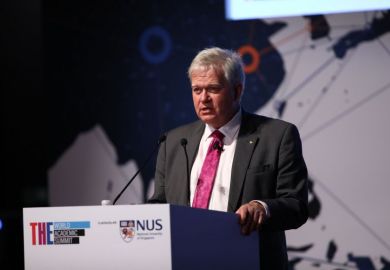Academics who succeed are “not necessarily the most talented” but rather those most able to withstand universities’ “intolerable job structure”, a Nobel laureate has said.
Speaking at Times Higher Education’s World Academic Summit, Brian Schmidt, vice-chancellor of the Australian National University and winner of the Nobel Prize in Physics in 2011, said outstanding early career researchers were too often forced to leave academia by “intolerable” demands on both their work and personal lives, rather than by an inability to do the job.
Professor Schmidt, a US-born astrophysicist who moved to the Canberra-based institution in 1994, which he has led since 2015, told a panel of senior university leaders that it was time to “create an academic structure that fits the lives of people and does not require them to bounce around the world three or four times on a short-term contract”.
“The people who survive that are not necessarily the most talented people – they are the people who have the willingness to put up with what is, quite frankly, an intolerable job structure,” Professor Schmidt told the audience at the summit, held at ETH Zurich, which has been addressing the theme “how talent thrives”.
Professor Schmidt said it was unrealistic to ask researchers to accept so much uncertainty in their early careers, with many gaining a sense of job security only in their early forties.
“We cannot expect people to wait to 42 to begin their career when, I’m afraid, in my career, we’ve all done our best work before the age of 40,” said Professor Schmidt.
He explained that the career progression model in academia was obsolete, having “evolved out [of] the 1960s and 1970s, when [the university sector] was growing and everyone had opportunities”.
In today’s higher education environment, very few PhD students or even postdocs would secure a permanent academic post, even if they attended a world-class university, Professor Schmidt argued.
“Even from the very esteemed universities [represented] on this panel [at the summit], only one in 10 [early career researchers is] going to end up in an academic position, and yet our professoriate makes it clear that you are a failure if you are not one of the one in 10,” he said. “That needs to stop,” he added.
Professor Schmidt said that universities should instead be more honest about researchers’ long-term career prospects and stress that leaving academia does not constitute failure if individuals secure good employment that makes use of their research skills.
“I am trying to come to [a] pact [with researchers] where the deal is…give people a three- to five-year start early on…but then it is, sort of, up or out,” said Professor Schmidt, who stressed that “out is not bad, out is great, but [also] have the [opportunity] for people to come in later in life”.
POSTSCRIPT:
Print headline: Toughest, not brightest, stay the course, says laureate
Register to continue
Why register?
- Registration is free and only takes a moment
- Once registered, you can read 3 articles a month
- Sign up for our newsletter
Subscribe
Or subscribe for unlimited access to:
- Unlimited access to news, views, insights & reviews
- Digital editions
- Digital access to THE’s university and college rankings analysis
Already registered or a current subscriber?










